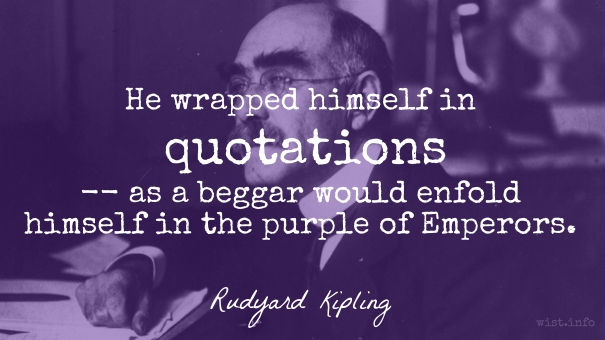Quotations about:
quotations
Note not all quotations have been tagged, so Search may find additional quotes on this topic.
This is the Achilles heel of quotation collections: An initial error in one will be repeated so often by others that over time it gains authority through repetition alone.
Ralph Keyes (b. 1945) American author.
“Nice Guys Finish Seventh”: False Phrases, Spurious Sayings, and Familiar Misquotations, ch. 13 (1992)
(Source)
Most collectors of verses and sayings proceed as though they were eating cherries and oysters, choosing the best first, and ending by eating them all.
[La plupart des faiseurs de recueils de vers ou de bons mots ressemblent à ceux qui mangent des cerises ou des huitres, choisissant d’abord les meilleurs, et finissant par tout manger.]
Nicolas Chamfort (1741-1794) French writer, epigrammist (b. Nicolas-Sébastien Roch)
Products of Perfected Civilization [Produits de la Civilisation Perfectionée], Part 1 “Maxims and Thoughts [Maximes et Pensées],” ch. 1, ¶ 2 (1795) [tr. Merwin (1969)]
(Source)
(Source (French)). Alternate translations:
Most of those who make collections of verse or epigram are like men eating cherries or oysters: they choose out the best at first, and end by eating all.
[tr. Mathers (1926)]
The majority of compilers of verse and sayings are like eaters of cherries and oysters, who pick out the best first and end by eating all.
[tr. Pearson (1973)]
Most authors of collections of poetry or epigrams proceed as though they were eating cherries or oysters. They start out by selecting the best, but wind up swallowing everything.
[tr. Dusinberre (1992)]
Most compilers of anthologies of poetry or of epigrams are like people eating cherries or oysters: they start by picking out the best and easting the lot.
[tr. Parmée (2003), ¶ 3]
Most compilers of verse or of bon mots resemble people who eat cherries or oysters, at first choosing the best ones, and finishing by eating everything.
[tr. Sinicalchi]
He wrapped himself in quotations — as a beggar would enfold himself in the purple of Emperors.
Rudyard Kipling (1865-1936) English writer
Many Inventions, “The Finest Story in the World” (1893)
(Source)






